Last Updated on January 25, 2025
16. Perl 6 at a Glance by Andrew Shitov
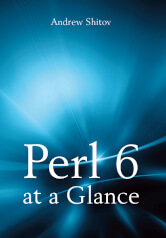 This book is about Perl 6, a programming language of the Perl family.
This book is about Perl 6, a programming language of the Perl family.
It covers many basic and in-depth topics of the language and provides the initial knowledge you need to start working with Perl 6.
The book does not require any previous experience with Perl, although some general understanding of programming is assumed.
17. Think Perl 6 by by Laurent Rosenfeld, with Allen Downey
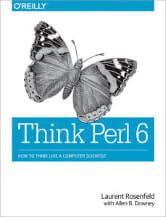 Think Perl 6 is an introduction to computer science and programming intended for people with little or no experience.
Think Perl 6 is an introduction to computer science and programming intended for people with little or no experience.
This aim of this book is not primarily to teach Perl 6, but instead to teach the art of programming, using the Perl 6 language. After having completed this book, you should hopefully be able to write programs to solve relatively difficult problems in Perl 6, but my main aim is to teach computer science, software programming, and problem solving rather than solely to teach the Perl 6 language itself.
Think Perl 6 is a free book available under a Creative Commons license.
18. Minimum Viable Perl by kablamo
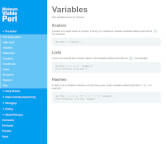 Minimum Viable Perl is for developers who want to get up to speed with Perl quickly through concise tutorials.
Minimum Viable Perl is for developers who want to get up to speed with Perl quickly through concise tutorials.
In order to keep things short and to the point the author also chosen to be opinionated and intentionally left out some dicussions and edge cases that were uncommon or not essential. Instead he links to more information.
19. Programming Perl by Kirrily Robert, Paul Fenwick, Jacinta Richardson
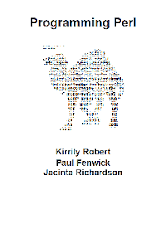 Programming Perl is a five day module in which you will learn how to program in Perl.
Programming Perl is a five day module in which you will learn how to program in Perl.
It assumes you have programmed before, that you understand the concept of variables, conditional and looping constructs, and the use of user defined functions.
Chapters include:
- A brief guide to Perl and perldoc.
- Creating and running a Perl program.
- Perl variables.
- Operators and functions.
- Conditional constructs.
- Subroutines.
- Regular expressions.
- Introduction to Modules.
- External Files and Packages.
- Writing modules.
- Building modules with Module::Starter.
- Testing your module.
- Using Perl objects.
- References and complex data structures.
- Advanced regular expressions.
- File I/O.
- System interaction.
- Practical exercises.
This book is released under the Open Publications License 1.0.
20. SDL::Manual Writing Games in Perl by Kartik Thakore
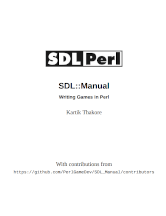 Simple DirectMedia Layer(orlibsdl) is a cross-platform C library that provides access to several input and output devices. Its most popular usage is to provide access to the video framebuffer and input devices for games. SDL also has several extension libraries to provide features such as text display, sound mixing, image handling, and graphics effects.
Simple DirectMedia Layer(orlibsdl) is a cross-platform C library that provides access to several input and output devices. Its most popular usage is to provide access to the video framebuffer and input devices for games. SDL also has several extension libraries to provide features such as text display, sound mixing, image handling, and graphics effects.
This book has a two-fold purpose: first, to introduce game development to Perl programmers, and second, to introduce Modern Perl concepts through game development. While the examples assume some experience with Perl, no experience with SDL in Perl or as libsdl itself is necessary. The book presents a progression from simple to intermediate examples and provides suggestions for more advanced endeavors.
The chapters of this book increase progressively in complexity, but each chapter has a singular goal (such as chapter five’s Making Pong) which stands alone as an individual tutorial.
Next page: Page 5 – Perl 5 Internals and more books
Pages in this article:
Page 1 – Modern Perl and more books
Page 2 – Impatient Perl and more books
Page 3 – The Perl Reference Guide and more books
Page 4 – Perl 6 at a Glance and more books
Page 5 – Perl 5 Internals and more books
All books in this series:
| Free Programming Books | |
|---|---|
| Ada | ALGOL-like programming language, extended from Pascal and other languages |
| Agda | Dependently typed functional language based on intuitionistic Type Theory |
| Arduino | Inexpensive, flexible, open source microcontroller platform |
| Assembly | As close to writing machine code without writing in pure hexadecimal |
| Awk | Versatile language designed for pattern scanning and processing language |
| Bash | Shell and command language; popular both as a shell and a scripting language |
| BASIC | Beginner’s All-purpose Symbolic Instruction Code |
| C | General-purpose, procedural, portable, high-level language |
| C++ | General-purpose, portable, free-form, multi-paradigm language |
| C# | Combines the power and flexibility of C++ with the simplicity of Visual Basic |
| Clojure | Dialect of the Lisp programming language |
| ClojureScript | Compiler for Clojure that targets JavaScript |
| COBOL | Common Business-Oriented Language |
| CoffeeScript | Transcompiles into JavaScript inspired by Ruby, Python and Haskell |
| Coq | Dependently typed language similar to Agda, Idris, F* and others |
| Crystal | General-purpose, concurrent, multi-paradigm, object-oriented language |
| CSS | CSS (Cascading Style Sheets) specifies a web page’s appearance |
| D | General-purpose systems programming language with a C-like syntax |
| Dart | Client-optimized language for fast apps on multiple platforms |
| Dylan | Multi-paradigm language supporting functional and object-oriented coding |
| ECMAScript | Best known as the language embedded in web browsers |
| Eiffel | Object-oriented language designed by Bertrand Meyer |
| Elixir | Relatively new functional language running on the Erlang virtual machine |
| Erlang | General-purpose, concurrent, declarative, functional language |
| F# | Uses functional, imperative, and object-oriented programming methods |
| Factor | Dynamic stack-based programming language |
| Forth | Imperative stack-based programming language |
| Fortran | The first high-level language, using the first compiler |
| Go | Compiled, statically typed programming language |
| Groovy | Powerful, optionally typed and dynamic language |
| Haskell | Standardized, general-purpose, polymorphically, statically typed language |
| HTML | HyperText Markup Language |
| Icon | Wide variety of features for processing and presenting symbolic data |
| J | Array programming language based primarily on APL |
| Java | General-purpose, concurrent, class-based, object-oriented, high-level language |
| JavaScript | Interpreted, prototype-based, scripting language |
| Julia | High-level, high-performance language for technical computing |
| Kotlin | More modern version of Java |
| LabVIEW | Designed to enable domain experts to build power systems quickly |
| LaTeX | Professional document preparation system and document markup language |
| Lisp | Unique features - excellent to study programming constructs |
| Logo | Dialect of Lisp that features interactivity, modularity, extensibility |
| Lua | Designed as an embeddable scripting language |
| Markdown | Plain text formatting syntax designed to be easy-to-read and easy-to-write |
| Objective-C | Object-oriented language that adds Smalltalk-style messaging to C |
| OCaml | The main implementation of the Caml language |
| Pascal | Imperative and procedural language designed in the late 1960s |
| Perl | High-level, general-purpose, interpreted, scripting, dynamic language |
| PHP | PHP has been at the helm of the web for many years |
| PostScript | Interpreted, stack-based and Turing complete language |
| Prolog | A general purpose, declarative, logic programming language |
| PureScript | Small strongly, statically typed language compiling to JavaScript |
| Python | General-purpose, structured, powerful language |
| QML | Hierarchical declarative language for user interface layout - JSON-like syntax |
| R | De facto standard among statisticians and data analysts |
| Racket | General-purpose, object-oriented, multi-paradigm, functional language |
| Raku | Member of the Perl family of programming languages |
| Ruby | General purpose, scripting, structured, flexible, fully object-oriented language |
| Rust | Ideal for systems, embedded, and other performance critical code |
| Scala | Modern, object-functional, multi-paradigm, Java-based language |
| Scheme | A general-purpose, functional language descended from Lisp and Algol |
| Scratch | Visual programming language designed for 8-16 year-old children |
| SQL | Access and manipulate data held in a relational database management system |
| Standard ML | General-purpose functional language characterized as "Lisp with types" |
| Swift | Powerful and intuitive general-purpose programming language |
| Tcl | Dynamic language based on concepts of Lisp, C, and Unix shells |
| TeX | Markup and programming language - create professional quality typeset text |
| TypeScript | Strict syntactical superset of JavaScript adding optional static typing |
| Vala | Object-oriented language, syntactically similar to C# |
| VHDL | Hardware description language used in electronic design automation |
| VimL | Powerful scripting language of the Vim editor |
| XML | Rules for defining semantic tags describing structure ad meaning |
